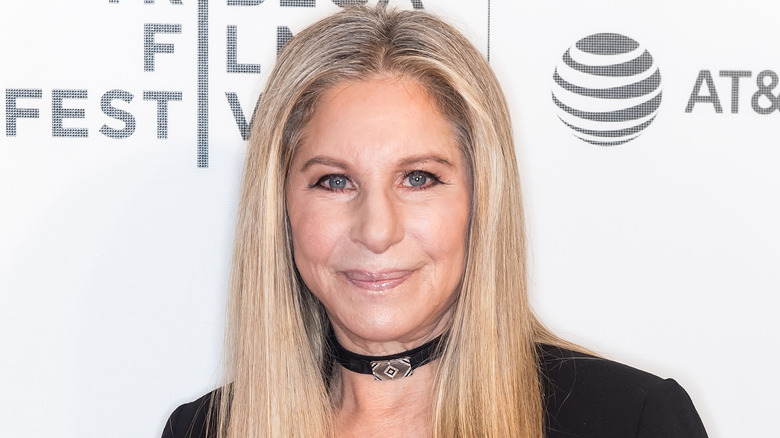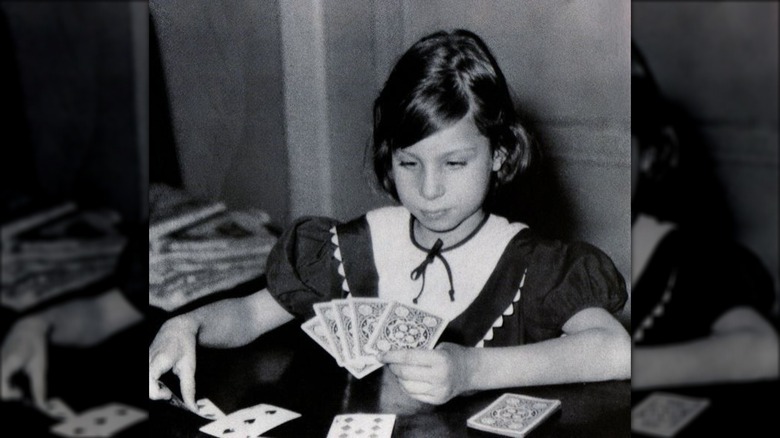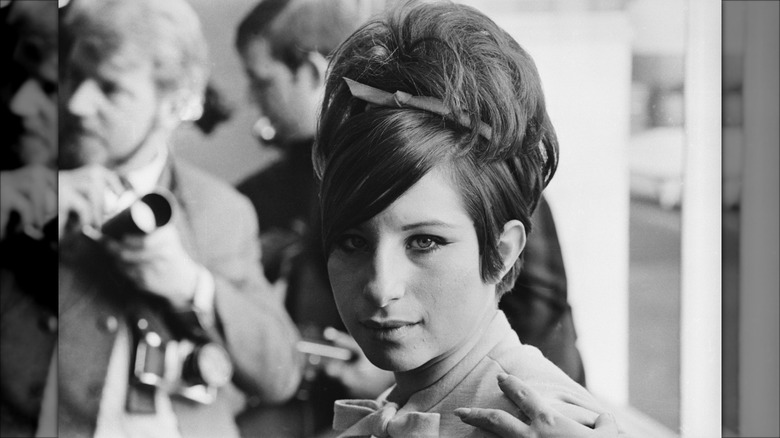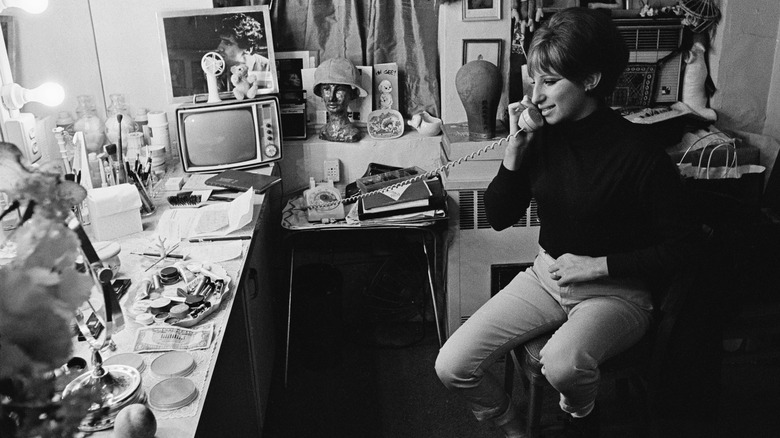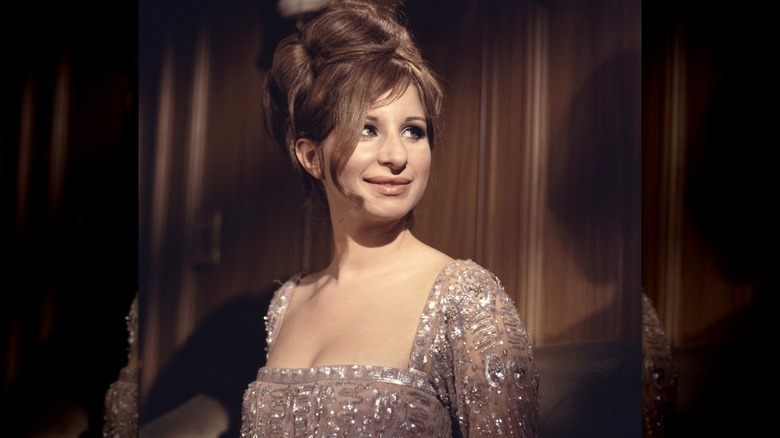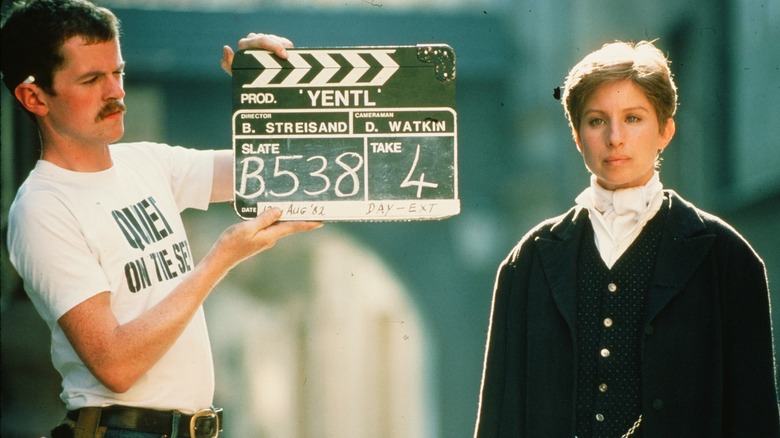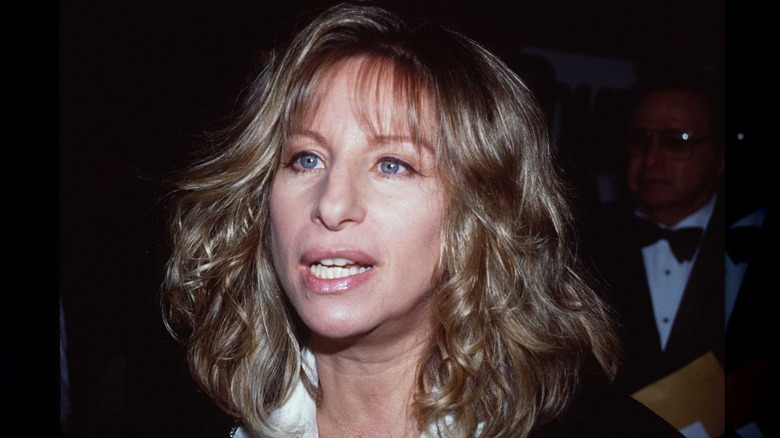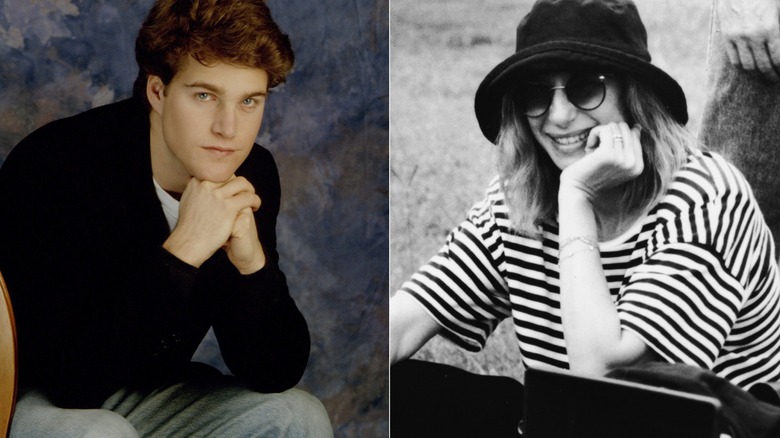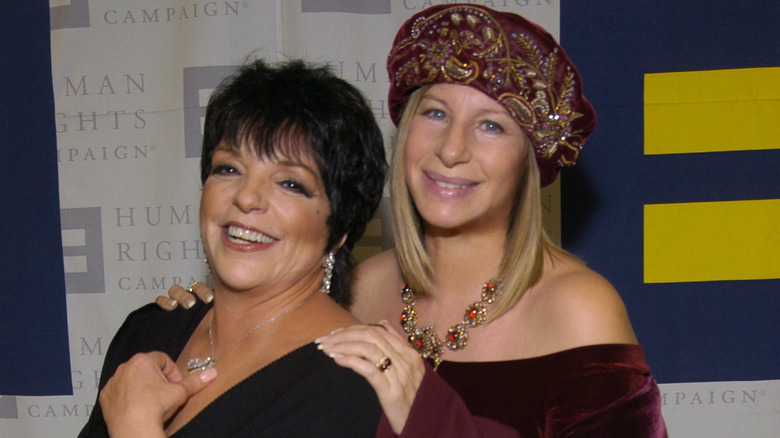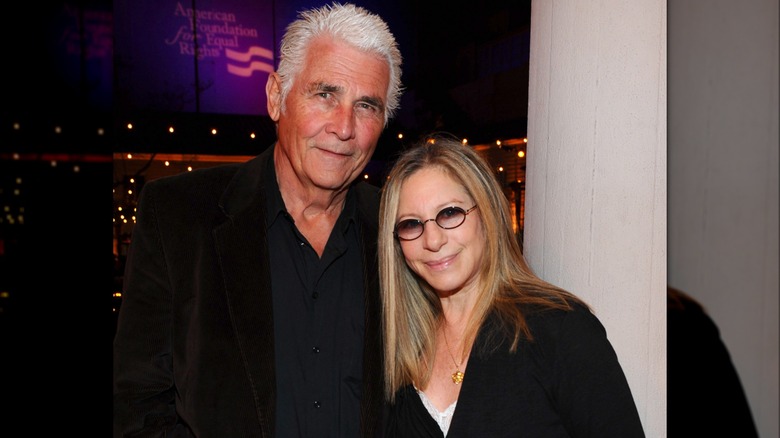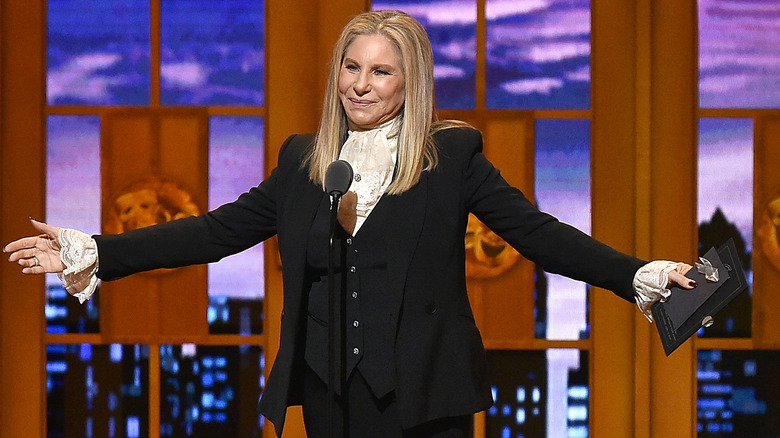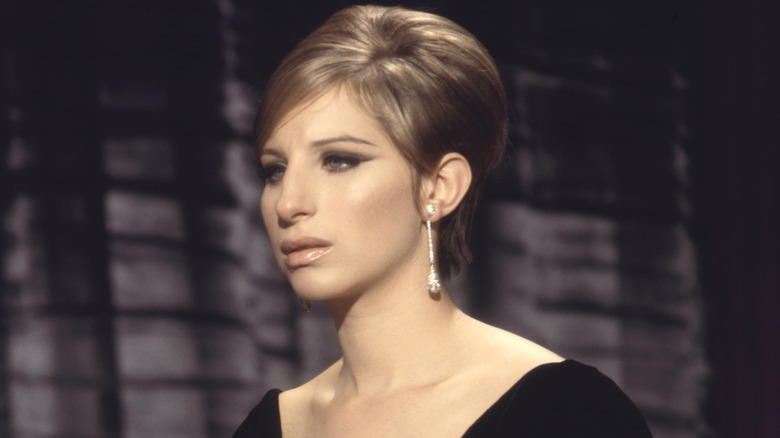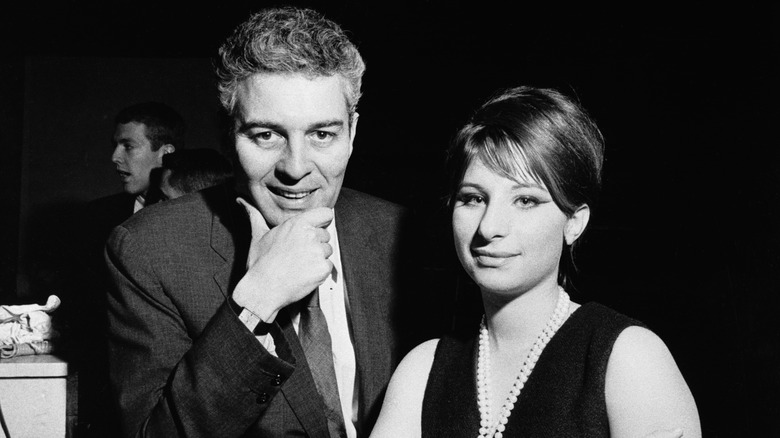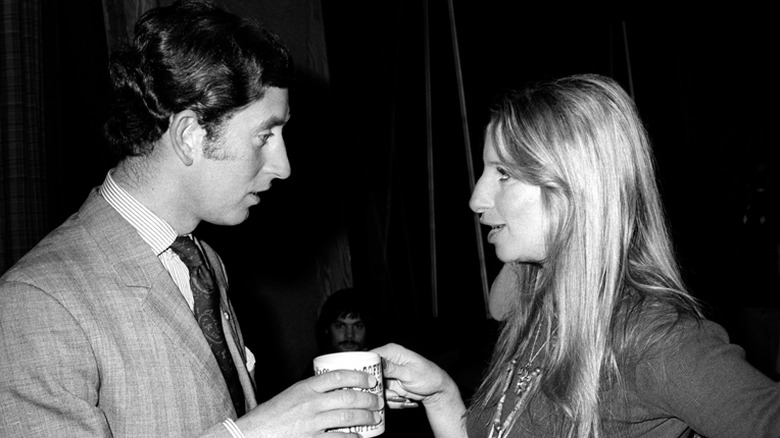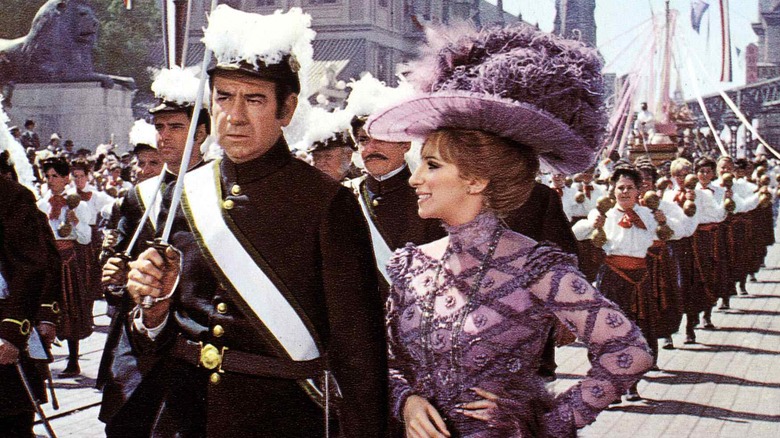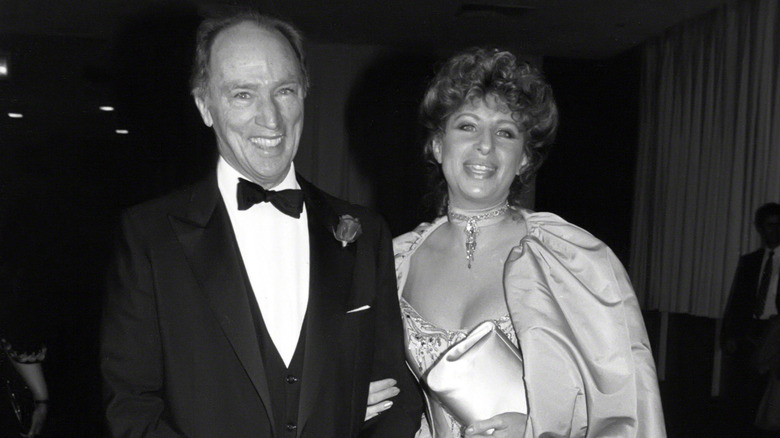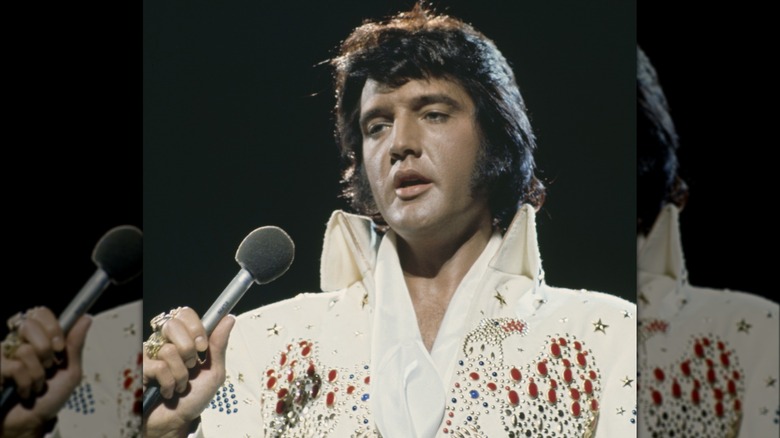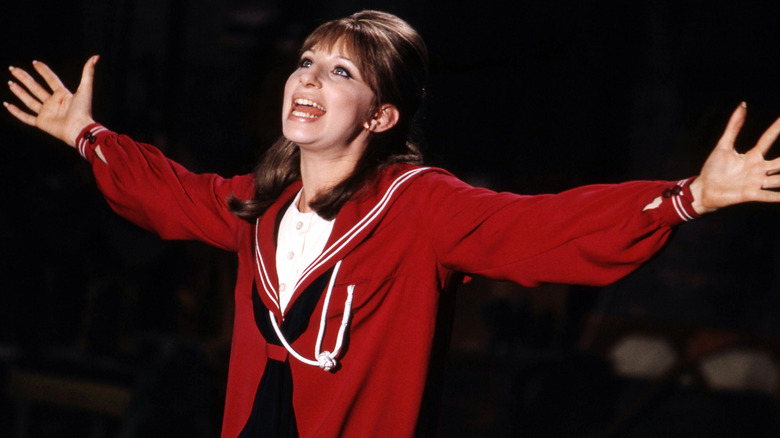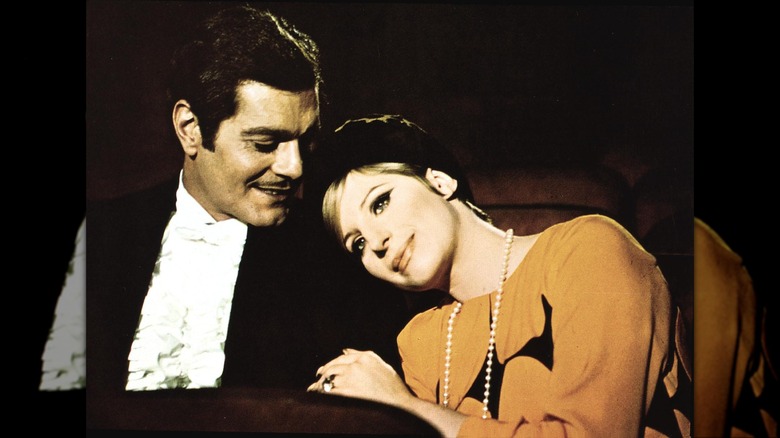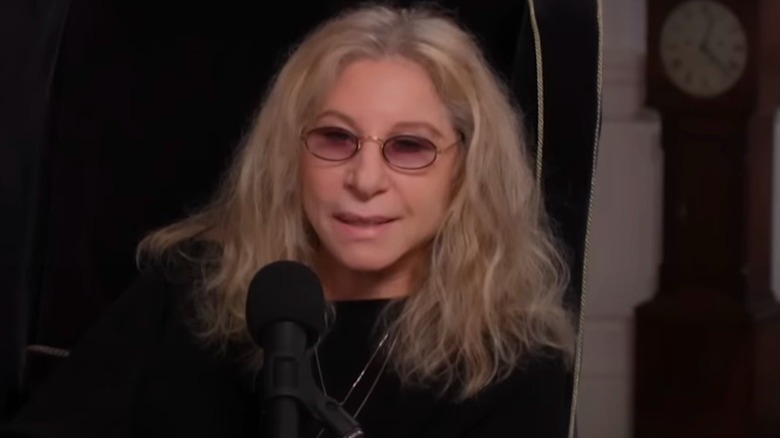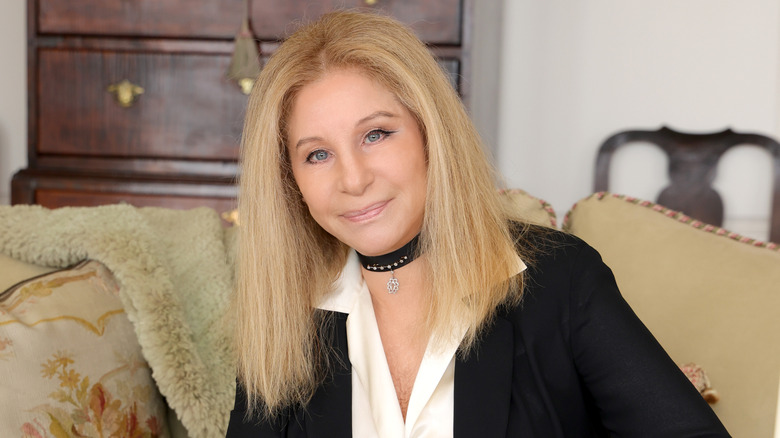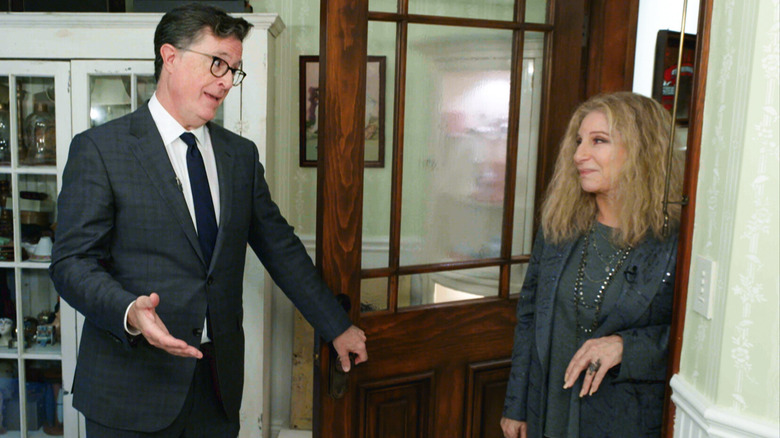The Untold Truth Of Barbra Streisand
Since bursting on the scene in the 1960s, Barbra Streisand has managed the rare feat of not only maintaining her considerable stardom, but actually increasing it over the course of the six decades that followed. Arguably one of the world's most talented vocalists, Streisand has also displayed her skills as an actor and film director, having appeared in numerous movies, three of which saw her doing double duty as both director and star. She's also one of the first EGOT winners; after winning the first of numerous Grammys in 1964, she won her first of multiple Emmys in 1965, followed by her first of two Oscars in 1969, and then a Tony Award for star of the decade in 1970 to complete the EGOT.
In an interview with Oprah Winfrey, Streisand marveled that her success has managed to endure for as long as it had. "I'm told I've had a No. 1 album in every decade since the '60s," she said, admitting that despite all the success she's achieved, she feels she's the same person she's always been. "I think of myself as a girl from Brooklyn," Streisand noted.
The Hollywood icon's been dazzling the world with her manifold talents for decades, but how well do her fans really know her? From her humble beginnings to her meteoric success — and later, her struggles in showbiz — read on for a closer look at the legendary career of everyone's favorite funny girl. This is the untold truth of Barbra Streisand.
Barbra Streisand grew up very poor
Although she's one of the richest and most famous celebrities in the world today, Barbra Streisand began her life as a poor kid in Brooklyn, NY. Her father, Emanuel Streisand, had sadly died when she was just 15 months old, leaving her to be raised by her mother, Diana Streisand.
"I grew up in Williamsburg until I was 7, and that was a $40-a-month apartment," Barbra told Oprah Winfrey. "I lived in one room with my mother, in the same bed, and my brother had a foldaway cot in the same room." The future star and her family later moved to the projects, which she considered "hotsie totsie" at the time. Those experiences stuck with her throughout her life. "When you grow up poor, you're always poor in a sense," she added.
Despite her humble beginnings, the singer has some fond memories of childhood. "I love the fact that we didn't have any money," Barbra told W magazine in 2016, recalling a doll she made from a hot water bottle. "I love the fact that one has to use one's own imagination to have toys or whatever."
Her mother was 'jealous' of her
According to a 1996 interview with The New York Times, Barbra Streisand said her mother was a soprano who boasted her own lovely singing voice, but that her shyness prevented her from becoming a performer. Their relationship, she added, grew fraught, due in part to her mother's brash, no-nonsense parenting style that continued as a teenage Streisand began to make a name for herself performing at nightclubs in Manhattan.
"When my mother came to see me her comment was: 'Your voice is very thin. You need eggs in your milk to make your voice stronger,'" Streisand told the Times. "She said she didn't want me to get a swelled head. I sure didn't have a swelled head. I had to go out into the world and prove I was something and I would be remembered in some way."
Speaking to NPR in 2012, Streisand claimed that her mother envied her success as a singer. Recalling an incident in which she was receiving Christmas presents, Streisand explained that her mother began to get emotional while saying things like, "'Why aren't you giving me presents? I'm her mother. I'm the mother.'" The "Funny Girl" star added, "It was the first time I realized she was actually jealous of me. And that was hard to take, I must say."
Barbra Streisand wasn't a big fan of performing live theater
Barbra Streisand quickly made a name for herself on Broadway thanks to her role in the 1961 musical "I Can Get It For You Wholesale," which earned her a Tony nomination. Her performance paved the way for her starring role in the iconic 1964 musical "Funny Girl," a role she would later reprise in 1968 in her big-screen debut. But despite her immediate success on the Great White Way, Streisand wasn't exactly a huge fan of performing in live theater.
"After a while, I really didn't like having to do eight shows a week," she told W magazine. "That's why I've always wanted to be in the movies, because I thought, once you get the scene right, you never have to do it again. And then you could go to your own opening night, which you could never do when you're on the stage!" she said with a laugh. Streisand continued, "I liked doing 'Funny Girl,' but not 1,000 times. ... And since I'm a kind of anal-retentive perfectionist, I would give notes after each performance — even [on] the last night."
Judy Garland gave her some wise words of advice
During her meteoric rise to fame, Barbra Streisand made a still-talked-about appearance on "The Judy Garland Show" in 1963, the same year she released "The Barbra Streisand Album," which won the Grammy for album of the year.
Following the show, during which they sang an awe-inspiring mash-up of "Get Happy" and "Happy Days Are Here Again," Garland occasionally visited Streisand to give her advice. "She came to my apartment in New York, and she said to me, 'Don't let them do to you what they did to me,'" Streisand told The New York Times. "I didn't know what she meant then. I was just getting started."
Of course, the tenacious Streisand would go on to have a different experience in Hollywood than Garland, and yet, speaking to NPR, Streisand said she felt she grew to understand Garland. Reflecting on how she thought Garland seemed anxious while holding her hand during their iconic duet, she noted, "When I think back on it, I think, 'Oh, my God, I know exactly what she's feeling.'" Streisand then expressed how — in the entertainment industry, in particular — it's common for people to begin rooting against performers as they age. "Part of me is much more relaxed than I've ever been, less frightened, less anxious," she said. "On the other hand, it's a coming-of-age-thing ... you wonder, 'Well, do I give it up? Do I retire? Or do I get more in before my time is up?'"
Barbra Streisand didn't immediately fit in with Hollywood
From an outsider's perspective, Barbra Streisand's transition from the stage to screen was met with remarkable success. Her very first movie role in 1968's "Funny Girl" won her the Academy Award for best actress. But as she tells it, not all of Hollywood welcomed her with open arms.
"You see, I committed a sin when I came to Hollywood [in 1967] because I came with a contract for three pictures, and I had never had a screen test," Streisand explained to The Hollywood Reporter in 2015. "So if there is such a thing as envy or jealousy, everybody was like, 'Huh? Who is she?' I wasn't a proven factor. Nobody knew what I would look like onscreen or anything like that."
Recalling how A-listers like Marlon Brando and John Wayne, as well as big-name producers and directors, attended a party thrown in her honor by producer Ray Stark around this time, Streisand admitted, "I was late because I was scared. I sat in a corner, and I wasn't charming."
She didn't realize her infamous Oscars dress was see-through
Speaking of the Oscars: while Barbra Streisand's performance in "Funny Girl" won over voters within the Academy, the awkward, see-through pantsuit she wore to the ceremony in 1969 didn't earn raves from fashion critics. In fact, to this day, the outfit still appears on lists of the worst Oscar ensembles ever.
Had Streisand known the pantsuit was see-through, she wouldn't have worn it in the first place. "That night, in my dressing room, I was choosing between two different outfits. One was lovely, but very conservative. And then there was the pantsuit with plastic sequins," she told W magazine decades later. "I had no idea that when the lights hit that outfit, it would become transparent! I wanted a white collar and cuffs, which it had, and I wore my hair under my chin, because I thought to myself, I'm going to win two Oscars in my lifetime, and I'll be more conservative next time."
Streisand's prediction came true. She won a second Oscar in 1977 for the song "Evergreen," and, yes, the outfit she wore to that ceremony was much more conservative.
Barbra Streisand developed a reputation for being difficult
Barbra Streisand has been accused of being difficult to work with, particularly as she transitioned from actor to director, beginning with 1983's "Yentl." By 1996, Streisand told The New York Times that she believed this reputation prompted directors such as Robert Zemeckis and Herbert Ross to turn down what eventually became her third directorial effort, "The Mirror Has Two Faces."
Of course, Streisand is unfortunately far from the first or last woman to face these types of allegations in the entertainment industry. And while she has admitted to being tough and controlling, she became an activist for women in film following her experience with "Yentl." Arguing that the rumors that have plagued her are the result of sexism in Hollywood, she rhetorically asked The Hollywood Reporter in 2015, "What does 'difficult' mean anyway?" Streisand added, "If a man on a set says something — 'I want to change this shot' — they do whatever he says. Now, if a woman asks... ."
"We're just measured by a different standard," she continued. "He's 'committed.' She's 'obsessed.' It's been said that a man's reach should exceed his grasp. Why can't that be true of a woman?" Using the critical response to Angelina Jolie's "By the Sea" as a more recent example, Streisand noted, "They call it her 'vanity production,' because she's doing the jobs I did. But [if a man does it], it's, 'How brilliant. He's multifaceted, he's multitalented, a multihyphenate.'"
She was deeply 'hurt' when the Oscars snubbed her for Yentl
While the reasons "Yentl" did not receive Oscar nominations for best picture, best director, and best actress were debated even in 1984, it reportedly did not change the fact that Barbra Streisand was hurt by the Academy of Motion Pictures Arts and Sciences' cold shoulder that year.
"She was very disappointed," Streisand's collaborator of many years, Marilyn Bergman, told People magazine. "She's only human." Although the star herself downplayed her initial reaction, Streisand did admit in 2017 that getting snubbed by the Academy might explain why she waited so long to direct her second movie, 1991's "The Prince of Tides." While doing press at the Tribeca Film Festival, she said (via Variety), "I must have been more hurt than I thought, because I didn't want to direct for years."
Barbra Streisand fired Chris O'Donnell from The Prince of Tides
Although she once claimed that reports about her firing multiple people from her movies were wildly exaggerated, Barbra Streisand has axed at least one famous face in her career — at least, according to actor Chris O'Donnell.
In 2016, the "NCIS: Los Angeles" star recalled an incident from his youth in which Streisand allegedly called his dorm room at Boston College to explain that the then-sophomore had been fired from "The Prince of Tides," in which he was meant to play her onscreen son. "It was very funny," he began to explain to Andy Cohen on "Watch What Happens Live" (so clearly, there are no hard feelings). "... I was living with some random people I didn't know very well, and I hadn't told anyone I had been making films because I wanted to know everybody without being the guy who made the films." Recalling how he'd just come back from the library, O'Donnell continued, "My roommate goes, 'Oh hey, D, uh, Barbra Streisand called you.' I go, 'Okay man, thanks.' He goes, 'What's up with that?' And I go, 'What'd they say?' 'She's calling back tomorrow at 1 o'clock.' And so the entire hall was waiting to answer the phone."
For her part, Streisand actually revealed years earlier why she'd decided to recast O'Donnell's role with her real-life son: Jason Gould had personally requested to play the part. "He never asks for anything," she told TV Guide in 2000. "... So I hired Jason and literally paid off O'Donnell."
Liza Minnelli helped her get over her stage fright
One of Barbra Streisand's most famous stories involves a concert in which stage fright caused her to forget the lyrics to her songs in front of a massive crowd. "I forgot my words in front of 150,000 people in Central Park. ... I remember it was a traumatic moment to go blank and I wasn't charming and cute about it," she recalled on "The Leonard Lopate Show" (via Playbill) in 2017.
According to Streisand, the trauma of that embarrassing experience prevented her from returning to the stage; with the exception of fundraisers for various charities, Streisand did not perform in front of a live audience for the next 27 years. In fact, it took seeing Liza Minnelli perform in someone's living room to convince Streisand to start performing again. "I thought, 'My God, look how she gets up and sings in front of these people ... with the lights on,'" she shared. "I have to have blackness when I sing, so these arenas give me the blackness. I can't perform. I'm just very uncomfortable performing live."
Barbra Streisand met James Brolin on a blind date
Barbra Streisand has been married twice, first to actor Elliott Gould. He was 25, and she just 21, when they tied the knot in 1963. They welcomed their son, Jason Gould, before eventually divorcing in 1971. Speaking with the Independent in 2012, Gould admitted that he'd struggled with Streisand's stratospheric fame and her relentless devotion to her career. "It was difficult to be married to someone who was married to their success," he said. Noting that their youth also played a part in their breakup, the "Friends" star added, "We went as far as we could together."
These days, however, Streisand's happily married to actor James Brolin, whom she met in the '90s on a blind date. "I met him at a dinner and expected a bearded mountain-man type, and he had cut off all his hair and was clean-shaven," she later told W magazine. "I asked him, 'Who screwed up your hair?' He later told me that's when he fell in love with me. My fella likes to hear the truth, which is unusual."
The two proved to be inseparable, eventually prompting Streisand to walk down the aisle a second time; the couple said "I do" in 1998.
She got Apple to change the way Siri says her name
With the exception of some (get it, Beyoncé!), people have had a difficult time correctly pronouncing Barbra Streisand's last name. Included on that list: Apple's "intelligent personal assistant," Siri. "She pronounces my name wrong," Streisand said during an interview with NPR in 2016. Noting that there's no "Z" sound found in her moniker, she added, "Streisand with a soft S, like sand on the beach. I've been saying this for my whole career."
Streisand being Streisand, she decided to take matters into her own hands and correct what Siri had been getting wrong. "I called the head of Apple, Tim Cook, and he delightfully agreed to have Siri change the pronunciation of my name, finally, with the next update. ... So let's see if that happens because I will be thrilled."
For the record, Cook made it happen, and Siri now pronounces Streisand's name properly. "That's one perk of fame," she quipped during a November 2023 interview with BBC News, clapping happily when her interviewer tested Siri, and Streisand's name was said as it is supposed to be. Behold, the power of Barbra Streisand.
Barbra Streisand's long-awaited memoir is as big as her life
In November 2023, Barbra Streisand unveiled a very personal project that had long been in the works: her memoir "My Name Is Barbra," which had taken her 10 years to write.
As fans discovered, this was no ghost-written cash grab, hitting career high points and recalling familiar anecdotes, but a starkly personal deep dive into her life, from her painful childhood to the heights of stardom. The book, she told BBC News, was her way of setting the record straight, correcting inaccurate things that had been written about her over the years and serving as the defining document about all things Barbra. "It was the only way to have some control over my life," Streisand explained. "This is my legacy. I wrote my story. I don't have to do any more interviews after this."
Not only is the book exhaustive, it's also long — like, 992 pages long. And while many celebs enlist others to narrate the audiobook versions (Rolling Stones guitarist Keith Richards' memoir "Life," for example, was famously read by Johhny Depp and Joe Hurley), Streisand chose to do the heavy lifting herself. The result is an epic audiobook that takes 48 hours and 14 minutes to get through. As Variety pointed out, the audiobook version not only allows listeners to hear Streisand tell her own story, but there's also some bonus material in the form of additional anecdotes that aren't in the book, along with snippets of the music she writes about.
Her Funny Girl co-star called her 'vicious names' on stage
It was Barbra Streisand's role in the 1964 Broadway production of "Funny Girl" that really put her on the map. Yet despite the accolades she won for the role, her experience on stage was one of misery, allegedly thanks in part to her co-star, Sydney Chaplin. As she wrote in her memoir (as excerpted by the Daily Beast), portraying lovers in the musical led to a brief flirtation between the two. "When you're playing a character who falls in love with another character onstage or onscreen, you have to find all the ways you could really love that person," Streisand explained. "And in that process, sometimes the two people actually do fall in love, for a while at least ... or maybe I should say, fall in attraction."
When Streisand (who was still married to Elliott Gould) nipped things in the bud by ending their emotional affair, Chaplin (who was likewise married) apparently responded viciously — each night, in full view of the audience. "He started muttering under his breath while I was talking on stage," Streisand told BBC News. "Terrible words. Curse words. And he wouldn't look into my eyes anymore. And you know, when you're acting, it's really important to look at the other person, and react to them."
Chaplin was eventually replaced by Johnny Desmond, but the difficult experience of dealing with Chaplin's behavior lasted more than a year, causing panic attacks and kickstarting Streisand's struggle with stage fright. As she wrote, it ultimately "scarred [her] for life."
Could she have been Queen Barbra?
Upon the death of his mother, Queen Elizabeth II, King Charles III ascended to the throne of England. Had things taken a different turn, however, Barbra Streisand might have been by his side as the future queen of England.
As she wrote in her "My Name Is Barbra" memoir (via an excerpt shared by Insider), she met then-Prince Charles back in 1974, when he visited Warner Bros. Studios. "The prince was utterly charming when he came to the studio," Streisand, who'd been in a recording session for "Funny Lady" at the time, wrote. While they hit it off, she added, "Frankly, it's hard to have a real conversation when you're surrounded by 50 photographers snapping pictures." Streisand continued, "I was drinking tea and offered him a sip ... and the future king of England actually drank from my cup, which was apparently unprecedented. When the British press reported on this, they turned it into the equivalent of an international incident."
That meeting came to spark a decades-long friendship that extended to the present, with Charles and Streisand remaining in touch over the years. As she wrote in her book, however, there was one piece of information that Streisand didn't have when they met that could have potentially altered the trajectory of that relationship. "I was told that Charles has said I was his 'only pinup' (apparently he had a poster of me in his room at Cambridge), and he described me as 'devastatingly attractive' with 'great sex appeal.' Who knew?" she wrote.
Her painful experiences with Gene Kelly and Walter Matthau
While coming up in Hollywood, Barbra Streisand was partnered with some major male stars — but not all of those pairings were harmonious. In fact, Streisand experienced that problem to a double degree while making 1969's "Hello, Dolly!" As she wrote in "My Name Is Barbra," she wound up clashing with both her co-star, Walter Matthau, and the film's director, the legendary Gene Kelly.
Of the former, Streisand recalled enraging Matthau when she suggested an adjustment to the script. "He looked at me with pure venom and said, 'You may be the singer in this picture, but I'm the actor! I have more talent in my farts than you have in your whole body!'" Streisand claimed in her book (via People). "I was stunned. ... I just stood there and was so humiliated that I ran off the set, crying."
She also wasn't impressed with Kelly's alleged treatment of women on the set. "One day he was so rude to a female dancer that I asked him privately, 'Why were you so mean to her?'" she wrote. "And he basically laughed it off and said, 'Yeah, I was pretty tough on her, but that's okay. I used to yell like that at another dancer, and she became my wife.'" Apparently, in both cases, neither Kelly nor Matthau ever apologized to her for their crude, rude behavior toward Streisand.
Barbra Streisand had a romance with a Canadian prime minister
Not only could Barbra Streisand potentially have become the Queen of England, she also had a shot at being the spouse of a head of state: Pierre Trudeau, the late prime minister of Canada (whose son, Justin Trudeau, went on to hold the same office). In an excerpt from her memoir appearing in People, the singer wrote about her short-lived romance with the elder Trudeau, whom she first met at the London premiere of 1968's "Funny Girl" movie.
"Trudeau was very dapper, intelligent, intense ... kind of a combination of Albert Einstein and Napoleon (only taller). And he was doing important work," Streisand wrote. "I was dazzled." Of their dynamic, she added, "It was nice to be with a man who had his own light shining on him, so I could stay in the shadows a bit." According to Streisand, she and Pierre went on to make several trips to visit each other, including the time she met him in the Canadian capital of Ottawa, where she watched in horror from beneath the warmth of a fur coat as he rolled around in snow after skinny-dipping in a frigid lake.
Ultimately, Streisand admitted she had a tough time getting over their considerable age gap (Pierre was 23 years her senior), but she conceded that this wasn't the only issue. Noting that "there was something missing," she wrote, "My brain was in love, but not my body." Nevertheless, while the romance didn't last long, Streisand and Pierre Trudeau's friendship lasted until his 2000 death.
Elvis was supposed to be her co-star in A Star Is Born
As an actor, one of Barbra Streisand's most ambitious projects was "A Star Is Born," the 1976 film in which she played an unknown singer taken under the wing of a veteran music star (portrayed by Kris Kristofferson), only to eclipse his own fame. One of the revelations Streisand shared in her memoir (via USA Today) was that Elvis Presley had been the first choice for Kristofferson's character, a role that could have been a Hollywood comeback for the King during an era when he was perceived as a has-been regurgitating his greatest hits to glassy-eyed tourists in Las Vegas.
Streisand herself flew out to Sin City to discuss the project with Presley. "Elvis was interested," she wrote. But a deal couldn't be reached, she'd heard, because the money demanded by Presley's notorious manager, Colonel Tom Parker, was well beyond the movie's budget; plus, Parker was apparently insistent on producing the movie himself. "I'm not sure about that," Streisand conceded. "I do know that Elvis had gained a lot of weight and was no longer at the top of his game, although he was still drawing big audiences. Maybe the story was a little too close to his own life, and the Colonel talked him out of it."
Ultimately, Streisand felt that everything worked out the way that it was meant to. "In any event, I had no regrets about Elvis," she wrote, per People. "Kris was it."
Filming her first movie made Barbra Streisand want to direct
Looking back at Barbra Streisand's career in the rearview mirror, it seems inevitable that she'd eventually become a movie director. Writing in her memoir, Streisand recalled how, while making her first film "Funny Girl," she displayed some directorial instincts by making filmmaking suggestions for certain scenes. Having initially lip-synced to her recorded version of "My Man," as per movie-musical tradition, she even requested the chance to film the scene again after production had wrapped, this time while singing live.
"Although I didn't realize it at the time, I was thinking like a director," Streisand wrote (via USA Today), recalling that she became engrossed in understanding the big-picture elements of the film. "How does that scene pertain to the next one? Does that moment serve the story?" she noted. What Streisand saw as genuine curiosity about the filmmaking process, however, was seen by others as a grasp for control. "But I guess some people had a hard time with a woman who had opinions, and word went out that I was taking over," she added.
Luckily, her actual collaborators welcomed her feedback — and "Funny Girl" director William Wyler later presented Streisand with a director's megaphone on which was imprinted, "Barbra Streisand DGA," the initials of the Directors Guild of America. "I was so thrilled that he thought enough of my ideas to give me such an inspiring gift, encouraging me to direct," she wrote of Wyler's gesture. "It was funny and prophetic and it's one of my most prized possessions."
Funny Girl co-star Omar Sharif was smitten with her
In "Funny Girl," Barbra Streisand made her movie debut alongside dashing actor Omar Sharif, who'd become a big-screen heartthrob thanks to his roles in "Doctor Zhivago" and "Lawrence of Arabia." Sharif played Nick Arnstein in the movie-musical, rakish husband of Streisand's Fanny Brice — and in her memoir, Streisand recalled that Sharif was as smitten with her as Nick was with Fanny.
Meanwhile, Streisand was coming to terms with the realization that her marriage to Elliott Gould had run its course, all while she was starring in her first motion picture. "I had achieved my dream ... but at the same time, I was losing my husband," Streisand wrote (via USA Today). "And I didn't know how to fix it, or if I even wanted to. And I had a nine-month-old baby. I felt so vulnerable. You can see it in my eyes."
While she and Sharif became close, the most intimate they ever got offscreen was holding hands. "Our attraction to each other worked for the movie, but I couldn't see a future with him," Streisand wrote. Still, in more recent years, Streisand came across love letters Sharif had sent her decades prior, which certainly paint a picture of a man besotted. "Recently I had the chance to meet his grandson," she continued, "who said Omar told him: 'Aside from your grandmother, Barbra is the only woman who ever captured my heart. If things had turned out differently, she could have been your bubbie!'"
The one project that regretfully got away from Barbra Streisand
Over the course of a showbiz career that's in its seventh decade, as of this writing, Barbra Streisand has achieved everything she'd ever dreamed of ... almost. The one project she's been trying to get off the ground for years is a film adaptation of the musical "Gypsy," in which she would direct and star as Mama Rose, arguably one of Broadway's juiciest roles. In fact, as far back as 2011, a source told The Hollywood Reporter that Streisand was "seriously engaged in the idea of doing it." In 2016, Variety reported that Barry Levinson was attached to direct, while Streisand would star.
Appearing on "The Howard Stern Show" in November 2023, Streisand revealed that one reason she wrote her "My Name Is Barbra" memoir is that she wasn't able to make two movies she'd been passionate about; "Gypsy" was one. "I wanted to end my career playing Gypsy," she said. "... And now, because I wanted to direct it, and I could see every frame." It was the musical's lyricist, the late Stephen Sondheim, who was insistent that pal and former collaborator Streisand would be biting off more than she could chew if she both directed and starred. "He said, 'You either direct the movie, or you act in it. But you can't do both.'" Streisand, who'd done just that — very successfully, and more than once — was understandably crushed.
However, Streisand remained circumspect about the one that got way. "There are things in life that you can't have," she mused.
How 'the Streisand effect' came to be
Back in the late 1990s, a unique initiative began collecting thousands of aerial photos of the California coastline for a survey, the California Coastal Records Project. As it happened, one of those photos featured the beachfront Malibu mansion of Barbra Streisand. Per the Los Angeles Times, she sued the photographer for $10 million in damages in 2003, alleging that her privacy had been invaded. Prior to that, court documents proved that the photo of Streisand's home had only been viewed six times. After she filed suit, however, that same photo had been viewed more than 420,000 times — due to the publicity drummed up by her lawsuit (she wound up losing, by the way, and was ordered to shell out $177,000 for the shutterbug's legal costs).
That all led Mike Masnick of Techdirt to coin the phrase "the Streisand effect," which in essence describes something that would have otherwise been ignored but becomes a huge news story or goes viral due to an extreme reaction that draws attention to it.
As it turned out, Streisand has indeed heard of "the Streisand effect," but she initially didn't understand what it was. "When I first heard the term, I naively thought, Is that about the effect of my music?" she wrote in her memoir, as reported by Vanity Fair. "Little did I know."
Barbra Streisand has a mall in her basement
One of the more apocryphal legends about Barbra Streisand holds that she has her own private mall in the basement of her Malibu mansion. As it turns out, that particular bit of lore is actually true. The small mall features several faux shops devoted to antiques and memorabilia, including one that displays all the various costumes that Streisand has worn on screen and stage over the years.
In a November 2023 segment on "The Late Show," host Stephen Colbert paid a visit to Streisand's home, where she took him on a tour that included the subterranean mall. "Few people have had the chance to see the replica shopping mall she's built to display her vast antique collection," Colbert said in a voiceover, accompanying shots of her mall, which Streisand insisted is a misnomer.
"It's a little tiny mall, if you want to say," she told Colbert. In addition to a gift shop, another of the shops, Bee's Doll Shop, features Streisand's expansive array of antique dolls. "Did you think about calling it Hello, Dolly?" Colbert quipped. "I did not," responded Streisand with a hearty laugh.

